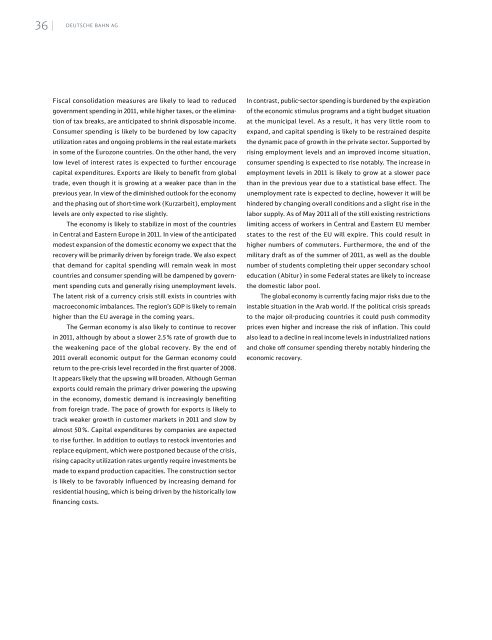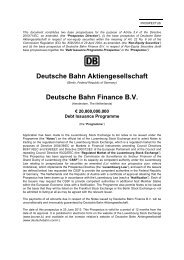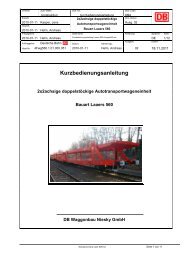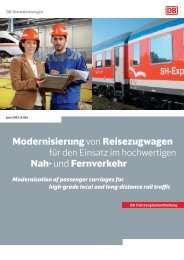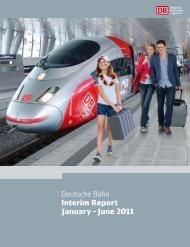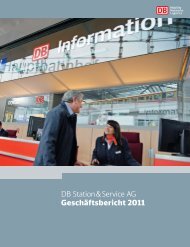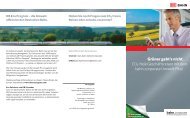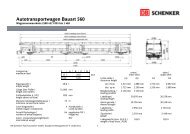PDF Download - Deutsche Bahn AG
PDF Download - Deutsche Bahn AG
PDF Download - Deutsche Bahn AG
You also want an ePaper? Increase the reach of your titles
YUMPU automatically turns print PDFs into web optimized ePapers that Google loves.
36 |<br />
DEUTSCHE BAHN <strong>AG</strong><br />
Fiscal consolidation measures are likely to lead to reduced<br />
government spending in 2011, while higher taxes, or the elimina-<br />
tion of tax breaks, are anticipated to shrink disposable income.<br />
Consumer spending is likely to be burdened by low capacity<br />
utilization rates and ongoing problems in the real estate markets<br />
in some of the Eurozone countries. On the other hand, the very<br />
low level of interest rates is expected to further encourage<br />
capital expenditures. Exports are likely to benefit from global<br />
trade, even though it is growing at a weaker pace than in the<br />
previous year. In view of the diminished outlook for the economy<br />
and the phasing out of short-time work (Kurzarbeit), employment<br />
levels are only expected to rise slightly.<br />
The economy is likely to stabilize in most of the countries<br />
in Central and Eastern Europe in 2011. In view of the anticipated<br />
modest expansion of the domestic economy we expect that the<br />
recovery will be primarily driven by foreign trade. We also expect<br />
that demand for capital spending will remain weak in most<br />
countries and consumer spending will be dampened by govern-<br />
ment spending cuts and generally rising unemployment levels.<br />
The latent risk of a currency crisis still exists in countries with<br />
macroeconomic imbalances. The region’s GDP is likely to remain<br />
higher than the EU average in the coming years.<br />
The German economy is also likely to continue to recover<br />
in 2011, although by about a slower 2.5 % rate of growth due to<br />
the weakening pace of the global recovery. By the end of<br />
2011 overall economic output for the German economy could<br />
return to the pre-crisis level recorded in the first quarter of 2008.<br />
It appears likely that the upswing will broaden. Although German<br />
exports could remain the primary driver powering the upswing<br />
in the economy, domestic demand is increasingly benefiting<br />
from foreign trade. The pace of growth for exports is likely to<br />
track weaker growth in customer markets in 2011 and slow by<br />
almost 50 %. Capital expenditures by companies are expected<br />
to rise further. In addition to outlays to restock inventories and<br />
replace equipment, which were postponed because of the crisis,<br />
rising capacity utilization rates urgently require investments be<br />
made to expand production capacities. The construction sector<br />
is likely to be favorably influenced by increasing demand for<br />
residential housing, which is being driven by the historically low<br />
financing costs.<br />
In contrast, public-sector spending is burdened by the expiration<br />
of the economic stimulus programs and a tight budget situation<br />
at the municipal level. As a result, it has very little room to<br />
expand, and capital spending is likely to be restrained despite<br />
the dynamic pace of growth in the private sector. Supported by<br />
rising employment levels and an improved income situation,<br />
consumer spending is expected to rise notably. The increase in<br />
employment levels in 2011 is likely to grow at a slower pace<br />
than in the previous year due to a statistical base effect. The<br />
unemployment rate is expected to decline, however it will be<br />
hindered by changing overall conditions and a slight rise in the<br />
labor supply. As of may 2011 all of the still existing restrictions<br />
limiting access of workers in Central and Eastern EU member<br />
states to the rest of the EU will expire. This could result in<br />
higher numbers of commuters. Furthermore, the end of the<br />
military draft as of the summer of 2011, as well as the double<br />
number of students completing their upper secondary school<br />
education (Abitur) in some Federal states are likely to increase<br />
the domestic labor pool.<br />
The global economy is currently facing major risks due to the<br />
instable situation in the Arab world. If the political crisis spreads<br />
to the major oil-producing countries it could push commodity<br />
prices even higher and increase the risk of inflation. This could<br />
also lead to a decline in real income levels in industrialized nations<br />
and choke off consumer spending thereby notably hindering the<br />
economic recovery.


